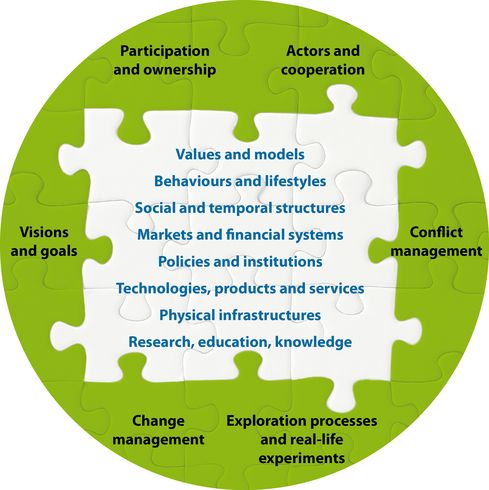The Theoretical Framework
The framework part of the project provides the theoretical and conceptual foundation of the project. The goal is to further develop an already outlined, Oeko-Institut-developed heuristic for transformations. The existing heuristic is based on a comprehensive analysis of existing literature on transformation and historical transformations.
First draft of a heuristic for describing social-economic transformation processes
Based on previous analyses, it is assumed that a variety of elements of sociotechnical systems must be addressed for the governance of transformations. For example, the development of innovative technologies alone is generally insufficient for initiating far-reaching change. Rather, the adaptation of policy instruments and institutions, among other elements, is also necessary to bring such developments into the mainstream (see the role of the German Renewable Energies Act (EEG) in the rise of renewable energy in Germany). The introduction of innovation can sometimes also be linked to a shift in behaviours and lifestyles (see for example the influence of social networks as a digital transformation on behaviours and lifestyles). Over the course of previous projects, eight system elements were identified (see the circle center of the graphic). Although all eight may not always play an important role, they should nevertheless each be at least considered when developing targeted support for a transformation.
In addition to these system elements, specific challenges to the governance of transformation processes have also been identified. Existing management instruments cannot be simply applied to societal transformations, due to their complexity and numerous interactions. Rather, they demand a special form of governance, such as new forms of participation and an intensive conflict management (see graphic). Given the fact that system connections are often unforeseeable and extremely complex, selected innovations (technical, as well as social or political) could be tested in so-called real experiments, initially with a precisely defined (primarily regional) scope. It is assumed, that the consideration of identified governance challenges will enable a consistent change of the system elements and thus allow for the transformation of the existing system.
Further development of the design model
Within this project the preliminary model will be supplemented by the analysis of further transformation processes (energy transition, and the expansion of organic farming/organic foods in Germany). Initial findings from the analysis of the three fields of application will also be incorporated.



